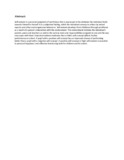| dc.contributor.author | Kariuki, Priscilla W | |
| dc.date.accessioned | 2013-03-18T06:48:05Z | |
| dc.date.issued | 2002 | |
| dc.identifier.citation | Journal of Faculty of Educion (FJFE) Number 1, 2002 | en |
| dc.identifier.uri | http://erepository.uonbi.ac.ke:8080/xmlui/handle/123456789/14315 | |
| dc.description.abstract | Self-esteem is a personal judgment of worthiness that is expressed in the attitudes the individual holds towards himself or herself It is a subjective feeling, which the
individual conveys to others by verbal reports and other overt expressive behaviour. Self-esteem develops from childhood through adulthood as a result of a person's interaction with the environment. This environment includes the individual's parents, peers and teachers as well as the various tasks and responsibilities assigned to one and the way one copes with them. Empirical evidence indicates that a child's self-concept affects his/her performance at school. A pupil with a positive self-concept has an improved chance of performing better than a pupil with a negative self-concept. A positive self-concept or high self-esteem is essential to personal happiness' and effective functioning both for children and for adults. | en |
| dc.description.sponsorship | University of Nairobi | en |
| dc.language.iso | en | en |
| dc.title | The development of self-esteem and its influence on academic achievement | en |
| dc.type | Article | en |
| local.publisher | School of education | en |

